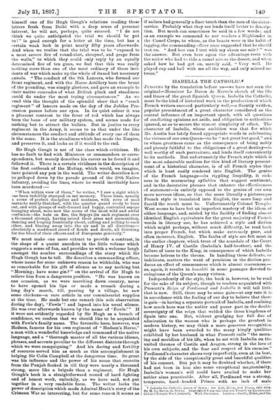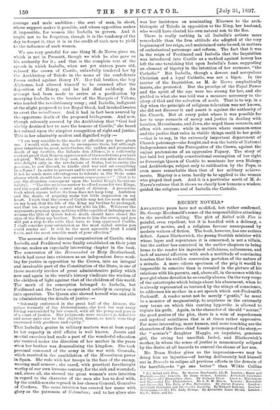ISABELLA THE CATHOLIC:*
JUDGING by the translation before us—we have not seen the original—Monsieur Le Baron de Nervo's sketch of the life and times of the great Spanish Queen, Isabella the Catholic, must be the kind of historical work in the production of which French writers succeed particularly well,—a fluently written, popular presentment of a great character considered as the central influence of an important epoch, with all questions of conflicting opinions set aside, and obligation to authorities ignored, so as to secure the utmost simplicity of effect. The character of Isabella, whose ambition was that for which Mr. Austin has lately found appropriate words in celebrating the virtues of our own Queen—to be "not great but good," and to whom greatness came as the consequence of being nobly and piously faithful to the obligations of a great destiny—is well worthy of such portraiture, and lends itself conveniently to its methods. But unfortunately the French style which is the most admirable medium for this kind of literary present- ment of a historical character, is of all French styles that which is least easily rendered into English. The genius of the French language—its rippling limpidity, it rich- ness in the murmuring syllables that suggest sentiment, and in the decorative phrases that enhance the effectiveness of statement—is entirely opposed to the genius of our own more nervous idiom, so that the more literally a picturesque French style is translated into English, the more limp and flaccid the result must be. Unfortunately Colonel Tem pie- West seems to have but an imperfect mastery of the idiom of either language, and, misled by the facility of finding almost identical English equivalents for the great majority of French words in literary use, he has achieved a. style and diction which might perhaps, without much difficulty, be read back into proper French, but which make extremely poor, and often incorrect, English. The faults of style are felt most in the earlier chapters, which treat of the scandals of the Court of Henry IV. of Castile (Isabella's half-brother), and the failure of issue to the King, in consequence of which Isabella became heiress to the throne. In handling these delicate, or indelicate, matters the want of precision in the diction pro- duces an effect of commonness which is almost coarseness,— as, again, it results in banalitg in some passages devoted to- enlogiums of the Queen's many virtues.
Independently of the style, the book is, however, to be read: for the sake of its subject, though to readers acquainted with Prescott's Reign of Ferdinand and Isabella it will tell little that is new. Still, there may be some gain—at any rate it in accordance with the feeling of our day to believe that there is gain—in having a separate portrait of Isabella, and realising how much hers was the nobler and purer part in the double sovereignty of the reign that welded the three kingdoms of Spain into one. But, without grudging her full due of admiration to the woman who is perhaps the greatest in modern history, we may think a more generous recognition might have been awarded to the many kingly qualities exhibited by her husband in what Prescott calls "the morn- ing and meridian of his life, when he sat with Isabella on the united thrones of Castile and Aragon, strong in the love of his own subjects, and the fear and respect of his enemies." Ferdinand's character shows very imperfectly, even at its beet, by the side of the exceptionally great and beautiful qualities of his consort. But yet it may be doubted whether, if there had not been in him also some exceptional magnanimity,. Isabella's woman's will could have availed to make her nobler aims practicable. After all, Ferdinand was a strong, temperate, hard - headed Prince with no lack of male • Isabella the Catholic. Queen of Spain: her Life. Reign, and Times, 14614604. By M. Le Baron de Nervo. Translated from the original French by Lieutenant- Colonel Temple-Waal (retired). With Pot traits. London : &with. Fdder, and Co.
courage and male ambition : the sort of man, in short, whose support makes it possible, and whose opposition makes it impossible, for women like Isabella to govern. And it ought not to be forgotten, though it is the tendency of the day to forget it, that it is to the credit of such men to yield to the influence of such women.
We are very grateful for one thing M. de Nervo gives us, which is not in Prescott, though we wish he also gave us his authority for it ; and that is the complete text of the speech in which Isabella, when not yet sixteen years old, refused the crown of Castile, unlawfully tendered her by the Archbishop of Toledo in the name of the confederate forces united against Henry IV. Her fall brother, the boy Alphonso, had allowed himself to be crowned after the deposition of Henry, and be had died suddenly. An attempt had been made to arrive at a pacification by marrying Isabella to the brother of the Marquis of Villena, who beaded the revolutionary army ; and Isabella, indignant at the slight proposed to her Royal blood, had invoked heaven to avert the rasalliance. And it had in fact been averted by the opportune death of the proposed bridegroom. And now, though solemnly assured by the Archbishop that "God had visibly destined her to save the honour of Castile," she based her refusal upon the simplest recognition of right and justice. This is her admirably modest and dignified reply :—
"I am very sensible to the marks of affection you have given me. I would wish some day to recompense them, but although your intentions be good, nevertheless the sudden and premature death of my brother, the Infante don Alfonso, is a sufficiently evident proof that Heaven approves not of the resolutions you have adopted. What else do they seek, those who run after novelties. who delight only in the revolutions of States, but to excite the passions, to sow discord, to kindle civil war and set everything in a flame ? In order to prevent and to avert so many evils, would it not be much more advantageous to tolerate in the State some abuses which should have less serious consequences ? " [that is to say, the disorders consequent upon the lawful King's licentious habits]. "The throne is too narrow to afford room for two Kings, and the royal authority cannot admit of division. A precocious fruit which ripens before its time does not keep long. Ambition and the desire of reigning make but little impression on my heart. I wish that the crown of Castile may not too soon descend on my head, that the life of the King my brother be prolonged, and that his reign may not end but with his life. 'Whatever the arguments you may urge, nothing willbe capable of inducing me to assume the title of Queen before death should have closed the eyes of the King my brother. Restore to him the crown, and you will put a stop to the evils that have so long oppressed Castile. I shall consider your submission as the most signal service you could render me. It will be the most agreeable fruit I could tlste, and the most sensible mark of your affection."
The account of the internal reorganisation of Castile, when Isabella and Ferdinand were finally established on their joint throne, makes an especially interesting chapter in the book.
The conversion of the Hermandad or Holy Brotherhood, which had come into existence as an independent force work- ing for justice in opposition to the Crown, into an integral and invaluable part of the Constitution of the State, is one of those masterly strokes of great administrative policy which now and again in the world's history vindicate the wisdom of the children of light against that of the children of this world.
The merit of its conception belonged to Isabella, but Ferdinand and the Cortes co-operated actively in carrying it into operation. The Queen also showed herself wise and able in administering the details of justice :— "Solemnly enthroned in the great hall of the Alcazar, the palace formerly of the Abderra.hmans, she took her seat every Friday surrounded by her council, with all the pomp and parade of a court of justice. Her judgments were received as detiniti7e and never gave rise to the slightest demur, so much were they impressed with goodness and equity."
That Isabella's genius in military matters was at least equal to her capacity in civil affairs is well known. Jousts and
martial exercises had made a part of the wonderful education she received under the direction of her mother in the years
when her brother was demoralising the kingdom. She took personal command of the army in the war with Granada, which resulted in the annihilation of the Mussnlman power
in Spain. She rode with her troops in the face of the enemy, wearing mail armour ; she cared, with practical forethought worthy of our own humane century, for the sick and wounded; and, above all, she showed the great woman's sure intuition in regard to the character of the men she has to deal with, by the confidence she reposed in her chosen General, Gonzalvo of Cordova. The same intuition has covered her name with glory as the patroness of Columbus ; and to her glory also
was her insistence on nominating Ximenes to the arch- bishopric of Toledo in opposition to the Xing, her husband, who would have elected his own natural son to the See.
There is really nothing in all Isabella's actions more remarkable than the firm attitude she adopted at the very beginning of her reign, and maintained unto its end, in matters of ecclesiastical patronage and reform. The fact that it was in the reign of Ferdinand and Isabella that the Inquisition was introduced into Castile as a method against heresy has left the one tarnishing blot upon Isabella's fame, suggesting an element of bigotry in the intention of her surname, "the Catholic." But Isabella, though a devout and scrupulous Christian and a loyal Catholic, was not a bigot. In the matter of the Inquisition, as M. de Nervo emphatically insists, she protested. But the prestige of the Papal Power and the spirit of the age were too strong for her, and she yielded to what she was told was a measure necessary to the glory of God and the salvation of souls. That is to say, in a day when the principle of religions toleration was not known, she did not discover it and assert it against the authority of the Church. But at every point where it was possible for her to urge counsels of mercy and justice in dealing with heretics, Mussulmans, and Jews, she urged those counsels, and often with success ; while in matters where common-sense and the justice that rules in visible things could be her guide —that is to say, in the extremely important department of Church patronage—she fought and won the battle of National Independence and the Prerogative of the Crown, against the unjust pretensions of an aggressive Papacy. The story of her bold but perfectly constitutional resumption of her right as Sovereign Queen of Castile to nominate her own Bishops and Archbishops, subject only to ratification by the Pope, is even more remarkable than that of her military achieve- ments. Bigotry is a term hardly to be applied to the woman who played that part. And it is a particular merit of DI. de Nervo's volume that it shows us clearly how humane a wisdom guided the religious zeal of Isabella the Catholic.







































 Previous page
Previous page